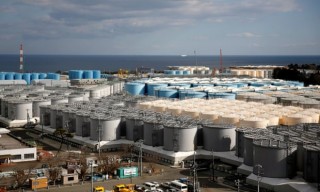Loading
Search
▼ Fukushima: Japan Will Have To Dump Radioactive Water Into Pacific, Minister Says
- Category:Other
More than a million tonnes of contaminated water lies in storage but power company says it will run out of space by 2022
The operator of the ruined Fukushima Daiichi nuclear power plant will have to dump huge quantities of contaminated water from the site directly into the Pacific Ocean, Japan’s environment minister has said – a move that would enrage local fishermen.
More than 1 million tonnes of contaminated water has accumulated at the plant since it was struck by a tsunami in March 2011, triggering a triple meltdown that forced the evacuation of tens of thousands of residents.
Tokyo Electric Power (Tepco) has struggled to deal with the buildup of groundwater, which becomes contaminated when it mixes with water used to prevent the three damaged reactor cores from melting.
Tepco has attempted to remove most radionuclides from the excess water, but the technology does not exist to rid the water of tritium, a radioactive isotope of hydrogen. Coastal nuclear plants commonly dump water that contains tritium into the ocean. It occurs in minute amounts in nature.
Tepco admitted last year that the water in its tanks still contained contaminants beside tritium.
Currently, more than 1m tonnes of contaminated water is held in almost 1,000 tanks at the Fukushima Daiichi site, but the utility has warned that it will run out of tank space by the summer of 2022.
“The only option will be to drain it into the sea and dilute it,” Yoshiaki Harada told a news briefing in Tokyo on Tuesday. “The whole of the government will discuss this, but I would like to offer my simple opinion.”
No decision on how to dispose of the water will be made until the government has received a report from a panel of experts. Other options include vaporising the liquid or storing it on land for an extended period.
Harada did not say how much water would need to be discharged into the ocean.
One recent study by Hiroshi Miyano, who heads a committee studying the decommissioning of Fukushima Daiichi at the Atomic Energy Society of Japan, said it could take 17 years to discharge the treated water after it has been diluted to reduce radioactive substances to levels that meet the plant’s safety standards.
Any decision to dispose of the waste water into the sea would anger local fishermen, who have spent the past eight years rebuilding their industry.
Nearby South Korea has also voiced concern over the impact it would have on the reputation of its own seafood.
Last month, Seoul summoned a senior Japanese embassy official to explain how Fukushima Daiichi’s waste water would be dealt with.
Ties between the north-east Asian nations are already at a low ebb following a compensation dispute over Koreans forced to work in Japanese factories during the second world war.
The government spent 34.5bn yen (£260m) to build a frozen underground wall to prevent groundwater reaching the three damaged reactor buildings. The wall, however, has succeeded only in reducing the flow of groundwater from about 500 tonnes a day to about 100 tonnes a day.
Japan has come under renewed pressure to address the contaminated water problem before Tokyo hosts the Olympics and Paralympics next summer.
Six years ago during the city’s bid for the games, the prime minister, Shinzo Abe, assured the international community that the situation was “under control”.
- September 10, 2019
- Comment (0)
- Trackback(0)


